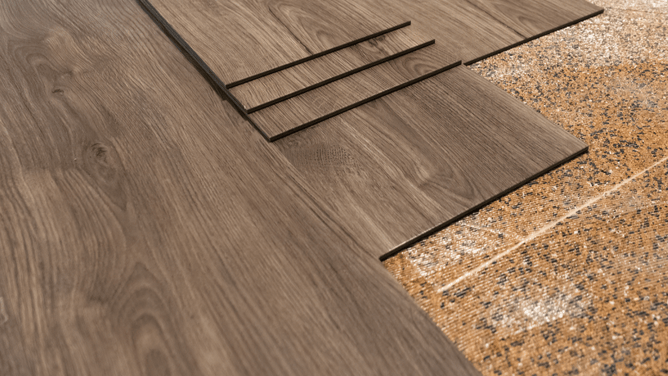Vinyl vs Laminate
When it comes to flooring, vinyl and laminate are two of the most popular options. Both are cost-effective alternatives to hardwood and tile, offering a variety of styles and finishes. But which one is right for your home? Let's break down the key differences between vinyl and laminate flooring so you can make an informed decision.
Vinyl Flooring - Durable and Moisture-Resistant
Pros:
Waterproof and Moisture-Resistant: One of the biggest advantages of vinyl is its ability to withstand moisture. It’s perfect for kitchens, bathrooms, basements, and laundry rooms where water is often a concern. Some types of vinyl, like luxury vinyl plank (LVP) and vinyl sheet flooring, are 100% waterproof, making them ideal for areas that see spills or high humidity.
Durability: Vinyl is highly resistant to scratches, dents, and stains, making it a great choice for high-traffic areas or homes with pets and children. It can stand up to heavy use without showing signs of wear quickly.
Variety of Designs: Vinyl comes in a wide range of styles, from realistic wood, stone, and tile looks to bold colors and patterns. You can achieve the look of natural materials without the high cost.
Ease of Maintenance: Cleaning vinyl floors is a breeze. Simply sweep, mop, or wipe up spills for a clean and fresh look. Vinyl is also stain-resistant, so it doesn’t require as much upkeep as some other flooring options.
Cons:
Comfort and Sound: While vinyl can be cushioned with underlayment, it doesn’t offer the same comfort as carpet. It can also create more noise when walking on it, especially in large, open areas.
Fading: Over time, vinyl flooring can fade if exposed to direct sunlight for long periods. UV rays can break down the color and cause the flooring to lose its vibrancy.
Laminate Flooring - Stylish and Budget-Friendly
Pros:
Affordable: Laminate is one of the most budget-friendly flooring options. It provides the look of hardwood or stone at a fraction of the price, making it a great option for those on a budget.
Durable Surface: Laminate is made with a tough outer layer that’s resistant to scratches, dents, and fading. It’s a great choice for high-traffic areas where heavy foot traffic might cause wear on other flooring types.
Variety of Styles: Laminate floors can mimic the appearance of natural wood, tile, or stone, with a wide range of finishes and designs. It's easy to find a laminate style that fits your home’s aesthetic.
Easy Installation: Many laminate floors feature a click-lock installation system, making them ideal for DIY projects. Even if you hire a professional installer, laminate is generally quick to install compared to other flooring options.
Cons:
Not Waterproof: Unlike vinyl, laminate is not water-resistant. It can swell or warp if exposed to water, so it’s not ideal for bathrooms, kitchens, or basements unless the product specifically offers water-resistant features.
Hard Surface: Laminate flooring doesn’t have the cushioning of vinyl or carpet, making it feel harder underfoot. It can also amplify noise in large areas.
Can’t Be Refinished: Unlike hardwood, laminate cannot be sanded or refinished. Once it starts to show signs of wear, you’ll need to replace the entire floor.
Vinyl vs. Laminate - Which One Should You Choose?
Ultimately, the choice between vinyl and laminate comes down to your specific needs and preferences.
Choose Vinyl if you need a waterproof, low-maintenance flooring option that can withstand moisture and high-traffic areas. It’s perfect for kitchens, bathrooms, and basements where durability and water resistance are essential.
Choose Laminate if you’re looking for an affordable option that mimics the look of wood or stone but doesn’t have to withstand moisture. It’s great for living rooms, bedrooms, and hallways where you want a stylish look without breaking the bank.
Both vinyl and laminate offer great benefits depending on the space and your lifestyle. If you need moisture resistance and durability, vinyl may be the better choice. If you’re after the look of hardwood without the cost, laminate could be your perfect solution. Whatever you choose, both options provide a budget-friendly, stylish alternative to traditional flooring materials.
Still unsure which one is best for your home? Our flooring experts are here to help! Contact us today for personalised advice and professional installation services.

